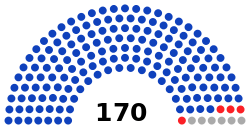National Legislative Assembly (South Sudan)
| National Legislative Assembly المجلس التشريعي الوطني | |
|---|---|
| Type | |
| Type | |
| Leadership | |
Speaker | |
Deputy Speaker | |
| Structure | |
| Seats | 170 |
 | |
Political groups | Independents (6) |
| Elections | |
Last election | Sudanese general election, 2010 (elections to predecessor body) |
| Meeting place | |
|
Ministries Complex Juba South Sudan | |
| Website | |
| Government of Southern Sudan | |
The National Legislative Assembly was established in 2011 by the interim constitution of South Sudan 2005. It is one of the two chambers comprising the National Legislature of South Sudan.
Composition
The National Legislative Assembly comprises:
- all persons who were members of the Southern Sudan Legislative Assembly; and
- all South Sudanese who were members of the National Assembly of Sudan, by virtue of their membership in that Assembly.
Members of the Council of Ministers who are not members of the National Legislative Assembly must participate in its deliberations but do not have the right to vote. Persons who wish to become members of the National Legislative Assembly must fulfill the eligibility requirements set down by the Constitution for membership of the National Legislature.
Role
The National Legislative Assembly exercises the following functions:[1]
- overseeing the performance of the National Government institutions;
- approving plans, programmes and policies of the National Government;
- approving budgets;
- ratifying international treaties, conventions and agreements;
- adopting resolutions on matters of public concern;
- summoning Ministers to answer questions of members of the Assembly on matters related to their ministries;
- interrogating Ministers about their performance or the performance of their ministries;
- approving appointments as required by the Transitional Constitution or the law;
- casting a vote of no confidence against the Vice President and any Minister;
- enacting legislation to regulate the conditions and terms of service of the Judiciary and its oversight mechanisms; and
- performing any other function as determined by the Transitional Constitution or the law.
References
- ↑ Art. 57 of the Interim Constitution of the Republic of South Sudan
This article is issued from Wikipedia - version of the 11/11/2016. The text is available under the Creative Commons Attribution/Share Alike but additional terms may apply for the media files.